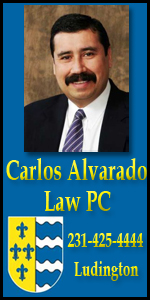
Former Hart Mayor Ron LaPorte, at right, discusses the DEQ issue that city is facing during a public meeting Wednesday evening at city hall.
By Allison Scarbrough. OCP Editor.
HART — Approximately 30 people, including city officials, consultants and local residents, attended a public meeting in the city hall community center Wednesday evening, Dec. 10, that focused on the Michigan Department of Environmental Quality’s claim that the city is violating water quality standards due to the Hart Dam.
The DEQ issue stems from temperatures in the south branch of the Pentwater River below the Hart Dam and Russell and Chippewa creeks exceeding 68 degrees. The bodies of water are subject to cold water fisheries standards.
The Hart Dam, built in 1927, is the focal point of the city’s hydroelectric system. It is one of just a few municipal hydroelectric operations in West Michigan.
“An extreme condition is losing the permit to generate electricity,” said Grand Rapids attorney Matt Zimmerman, who was hired by the city as a consultant. “Removing the dam would be a real dramatic step.” The DEQ has the authority to fine the city $25,000 per day if compliance is not met, he said. However, that would be extremely rare.

Hart City Manager Stan Rickard addresses the audience during a meeting Wednesday night at city hall that focused on the DEQ’s water temperature compliance order.
The city is currently negotiating an Administrative Consent Order (ACO) with the DEQ. If the city signs the ACO, it could be fined $3,000 per month for each month that the temperatures exceed 68 degrees for three years and then $5,000 per month. At this point, the city has not been fined. The DEQ has taken a more “teamwork” approach toward finding a solution, Zimmerman said.
Piper Tittle, a professional engineer with Lawson-Fisher Associates of South Bend, Ind., provided a detailed PowerPoint presentation. Tittle said the DEQ wants to turn Russell Creek, which currently runs through a culvert, into a “more free-flowing” stream in order to get colder water flowing.
Temperature readings were just a few degrees above the 68-degree maximum, with the highest reading at 71.8 degrees in the Pentwater River, downstream of the dam near 72nd Avenue, in July of 2013.
The water temperature issue ultimately affects the entire Pentwater River Watershed, which covers most of the county and the southern area of Mason County.
The DEQ views Russell Creek as a significant source of the warm water and suggests that the creek revert to a small stream to improve water temperatures below the Hart Dam, City Manager Stan Rickard said. No DEQ officials were present at the meeting.
Approximately half the audience consisted of residents who live near Russell Creek, and all seemed to be opposed to making any changes to the creek.
“Has there been anything done to eliminate other causes?” asked audience member Joe Bizon, who is the county prosecutor. “Why is it the assumption that the dam is causing it?” Bizon suggested that natural or human activity could be the cause.
Others in the audience asked if there is actual data showing that the trout population has been impacted by the warmer water.
“Our data shows there is a (water temperature) violation,” said Zimmerman, regarding the city’s automated monitoring. “There aren’t a lot of options. We could have ignored the DEQ; eventually they would have lost patience; and then they would have filed a lawsuit against us.”
By working with the DEQ to reach a resolution, “we control how we attempt to come back into compliance,” the attorney said.
Measures to resolve the temperature issue must be completed by the end of 2023, Tittle said, but damage payments could be enforced until compliance is met.
“I feel this ACO is extremely unfair to the city and to one of the poorest counties in Michigan,” said city councilman Rob Splane.
By signing the order, the city is essentially settling the issue with the DEQ, Zimmerman said, and would then agree to the DEQ’s solution and to pay the fines. The DEQ has taken a team approach with the city, but the agency seems to be putting more pressure on officials to sign the order. It will be up to the city council how it wants to proceed.
 (1).png)
.jpg)
-Mason-County-Press.png)




.png)









































.png)











